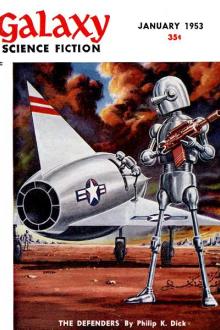Short Fiction - Philip K. Dick (100 books to read in a lifetime TXT) 📗

- Author: Philip K. Dick
Book online «Short Fiction - Philip K. Dick (100 books to read in a lifetime TXT) 📗». Author Philip K. Dick
“Can any of us fix anything? No. None of us can do that. We’re specialized. Each of us has his own line, his own work. I understand my work, you understand yours. The tendency in evolution is toward greater and greater specialization. Man’s society is an ecology that forces adaptation to it. Continual complexity makes it impossible for any of us to know anything outside our own personal field—I can’t follow the work of the man sitting at the next desk over from me. Too much knowledge has piled up in each field. And there’s too many fields.
“This man is different. He can fix anything, do anything. He doesn’t work with knowledge, with science—the classified accumulation of facts. He knows nothing. It’s not in his head, a form of learning. He works by intuition—his power is in his hands, not his head. Jack-of-all-trades. His hands! Like a painter, an artist. In his hands—and he cuts across our lives like a knife-blade.”
“And the other problem?”
“The other problem is that this man, this variable man, has escaped into the Albertine Mountain range. Now we’ll have one hell of a time finding him. He’s clever—in a strange kind of way. Like some sort of animal. He’s going to be hard to catch.”
Reinhart sent Dixon out. After a moment he gathered up the handful of reports on his desk and carried them up to the S.R.B. room. The S.R.B. room was closed up, sealed off by a ring of armed Security police. Standing angrily before the ring of police was Peter Sherikov, his beard waggling angrily, his immense hands on his hips.
“What’s going on?” Sherikov demanded. “Why can’t I go in and peep at the odds?”
“Sorry.” Reinhart cleared the police aside. “Come inside with me. I’ll explain.” The doors opened for them and they entered. Behind them the doors shut and the ring of police formed outside. “What brings you away from your lab?” Reinhart asked.
Sherikov shrugged. “Several things. I wanted to see you. I called you on the vidphone and they said you weren’t available. I thought maybe something had happened. What’s up?”
“I’ll tell you in a few minutes.” Reinhart called Kaplan over. “Here are some new items. Feed them in right away. I want to see if the machines can total them.”
“Certainly, Commissioner.” Kaplan took the message plates and placed them on an intake belt. The machines hummed into life.
“We’ll know soon,” Reinhart said, half aloud.
Sherikov shot him a keen glance. “We’ll know what? Let me in on it. What’s taking place?”
“We’re in trouble. For twenty-four hours the machines haven’t given any reading at all. Nothing but a blank. A total blank.”
Sherikov’s features registered disbelief. “But that isn’t possible. Some odds exist at all times.”
“The odds exist, but the machines aren’t able to calculate them.”
“Why not?”
“Because a variable factor has been introduced. A factor which the machines can’t handle. They can’t make any predictions from it.”
“Can’t they reject it?” Sherikov said slyly. “Can’t they just—just ignore it?”
“No. It exists, as real data. Therefore it affects the balance of the material, the sum total of all other available data. To reject it would be to give a false reading. The machines can’t reject any data that’s known to be true.”
Sherikov pulled moodily at his black beard. “I would be interested in knowing what sort of factor the machines can’t handle. I thought they could take in all data pertaining to contemporary reality.”
“They can. This factor has nothing to do with contemporary reality. That’s the trouble. Histo-research in bringing its time bubble back from the past got overzealous and cut the circuit too quickly. The bubble came back loaded—with a man from the twentieth century. A man from the past.”
“I see. A man from two centuries ago.” The big Pole frowned. “And with a radically different Weltanschauung. No connection with our present society. Not integrated along our lines at all. Therefore the S.R.B. machines are perplexed.”
Reinhart grinned. “Perplexed? I suppose so. In any case, they can’t do anything with the data about this man. The variable man. No statistics at all have been thrown up—no predictions have been made. And it knocks everything else out of phase. We’re dependent on the constant showing of these odds. The whole war effort is geared around them.”
“The horseshoe nail. Remember the old poem? ‘For want of a nail the shoe was lost. For want of the shoe the horse was lost. For want of the horse the rider was lost. For want—’ ”
“Exactly. A single factor coming along like this, one single individual, can throw everything off. It doesn’t seem possible that one person could knock an entire society out of balance—but apparently it is.”
“What are you doing about this man?”
“The Security police are organized in a mass search for him.”
“Results?”
“He escaped into the Albertine Mountain Range last night. It’ll be hard to find him. We must expect him to be loose for another forty-eight hours. It’ll take that long for us to arrange the annihilation of the range area. Perhaps a trifle longer. And meanwhile—”
“Ready, Commissioner,” Kaplan interrupted. “The new totals.”
The S.R.B. machines had finished factoring the new data. Reinhart and Sherikov hurried to take their places before the view windows.
For a moment nothing happened. Then odds were put up, locking in place.
Sherikov gasped. 99–2. In favor of Terra. “That’s wonderful! Now we—”
The odds vanished. New odds took their places. 97–4. In favor of Centaurus. Sherikov groaned in astonished dismay. “Wait,” Reinhart said to him. “I don’t think they’ll last.”
The odds vanished. A rapid series of odds shot across the screen, a violent stream of numbers, changing almost instantly. At last the machines became silent.
Nothing showed. No odds. No totals at all. The view windows were blank.
“You see?” Reinhart murmured. “The same damn thing!”
Sherikov pondered. “Reinhart, you’re too Anglo-Saxon, too impulsive. Be more Slavic. This man will be captured and destroyed within two days. You said so yourself. Meanwhile, we’re all working night and day on the war





Comments (0)